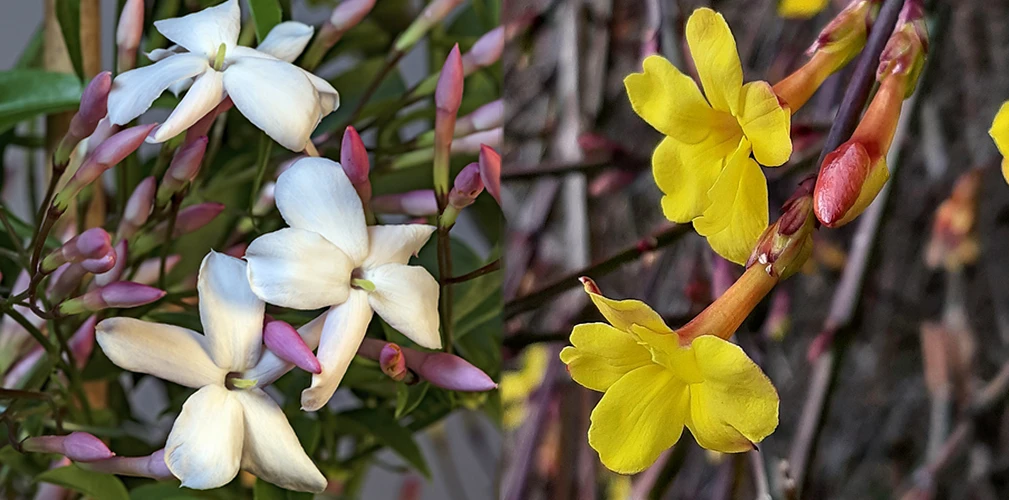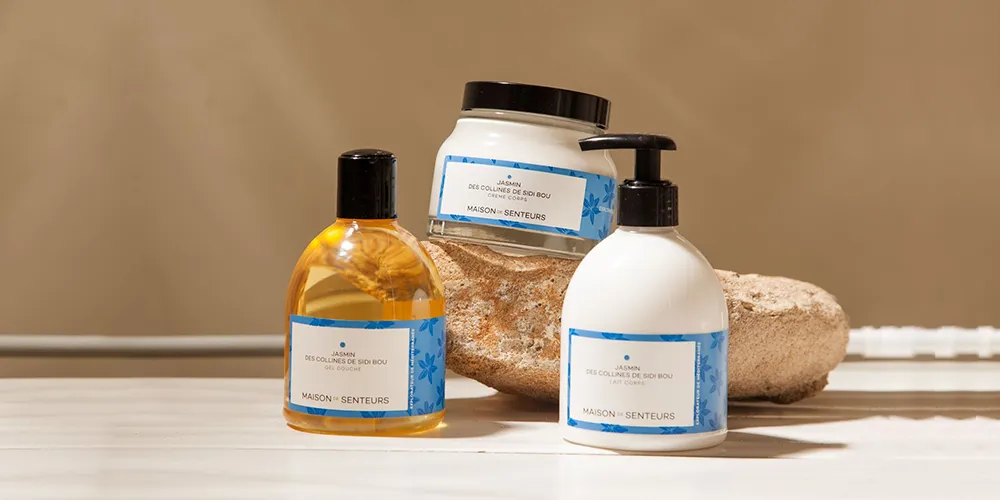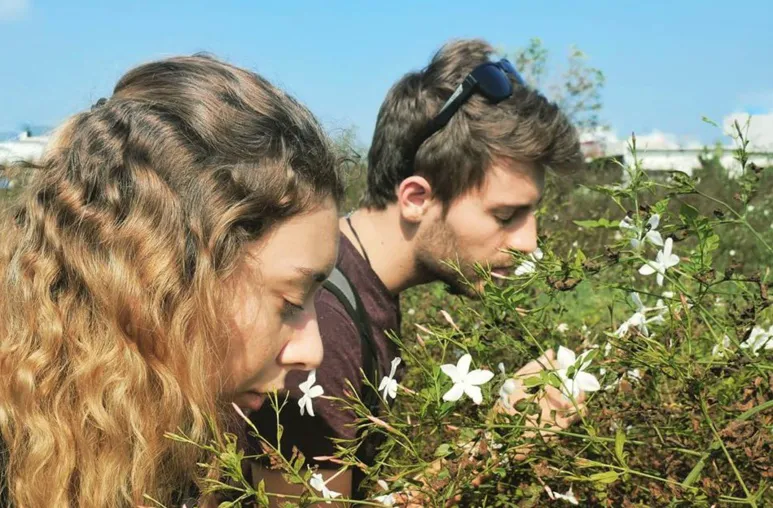Jasmine: The Iconic Flower
of Tunisia and a Perfume
Legend
Want to know everything about jasmine?
Discover its secrets, history, and symbolism
with Maison de Senteurs.
The Culture of Jasmine in Tunisia: A Mediterranean Treasure
White jasmine is the national flower of Tunisia, also known as the “Land of Jasmine.” Giving someone jasmine is a sign of love.
As dawn rises over the gardens of Tunis, a fragrant treasure awakens: jasmine. A legendary flower of summer nights and golden mornings, it has been at the heart of Mediterranean traditions for centuries.
Whether offered to guests as a welcome gesture, worn as necklaces or floral crowns during celebrations, jasmine is more than just a fragrance, it’s a symbol of elegance, softness, and escape. Its scent, both sunny and velvety, is a poetic scented balance between the fresh coolness of dawn and the gentle warmth of twilight.
Did you know? In Tunisia, a man wearing a sprig of white jasmine behind his left ear signals he is looking for love; behind the right, he’s found it. In Algeria, jasmine is worn proudly by the father, a discreet way to signal a daughter ready for marriage. A tradition as poetic as the flower itself.


Jasmine in Perfumery: “A Flower with a Thousand Facets”
A true jewel of perfumery, jasmine is one of the most sought-after raw materials for its voluptuous and sunny fragrance. Grown primarily in Grasse, Egypt, India, and China, jasmine lies at the heart of some of the most iconic perfumes in the world.
Two varieties dominate fine fragrance creation: The Jasmin Sambac, sensual and often found in oriental compositions & the Jasmin Grandiflorum, lighter and luminous, used in floral and chypre blends
Not all jasmine varieties are as fragrant as you’d expect: while Grandiflorum and Sambac are highly perfumed, others like winter jasmine (Jasminum nudiflorum) or American jasmine barely smell at all


Jasmine isn't just white. Some species, like Jasminum polyanthum, bloom in soft pink hues, while yellow jasmine lights up landscapes without necessarily filling the air with scent.
Picked at dawn to preserve their delicate aromas, jasmine blossoms are transformed into absolutes, a precious essence with honeyed, slightly spicy notes. Just like in our eau de toilette Jasmin des Collines de Sidi Bou: a pure and captivating scent that captures the soul of Tunisia.
Jasmine can shine on its own, or be paired with woody, amber or fruity notes. Either way, it remains a timeless olfactory signature, radiant one moment, mysterious the next.
Le jasmin peut être utilisé seul comme dans ce cas, ou en accord avec des notes boisées, ambrées ou fruitées, le jasmin demeure une signature olfactive intemporelle, tantôt éclatante, tantôt mystérieuse.
Our Jasmine-Inspired Perfumes
Inspired by the legend of Cleopatra meeting Marc Antony on a boat with sails soaked in jasmine essence, this solar perfume blends jasmine with cedarwood for a mystical evocation. Discover Jasmin des Rives du Nil
Jasmin d’une Promenade à Florence : A sophisticated floral creation where jasmine harmonizes with rose. Discover Promenade à Florence
Jasmin des Hauts du Belvédère:A delicate bouquet where jasmine meets lily of the valley for a poetic blend. Discover Jasmin des Hauts du Belvédère
.webp)
Jasmine’s Benefits: Beauty & Wellbeing
Renowned for its calming properties, jasmine has been used in cosmetics for centuries to soothe and regenerate. In Ancient Egypt, Rome, and Persia, people perfumed their baths with jasmine to indulge in its sensual and healing powers. Our jasmine infused hand creams, body milks, and shower gels leave your skin silky-soft and delicately scented.
Experience this sensory ritual with our jasmine care products : shower gel, body lotion and jasmine body cream.
In aromatherapy, jasmine acts as a natural anti-stress. Just a few drops of essential oil are enough to promote relaxation and emotional balance.
Even in the kitchen, jasmine has its place: jasmine tea is loved not only for its delicate taste, but also for its antioxidant, digestive, and calming properties.

Jasmine Around the World: Symbolism & Traditions
More than just a beautiful flower, jasmine is a universal symbol, full of meaning across different cultures and times.
In France, a 66th wedding anniversary is called a "Noces de Jasmin” jasmine wedding so if your love has lasted that long, jasmine is a must.


In India : Flower of love & Spirituality
Used in weddings and spiritual rituals, it symbolizes purity and love, often linked to the goddess Lakshmi and the god of love, Kama.
Our perfume Jasmin des Indes Orientales reflects this, blending jasmine with vanilla and sandalwood. In Ayurveda, sandalwood is said to stimulate the senses, calm mental chatter, and purify your chakras.
In China, Jasmine represents femininity and serenity
In China, Jasmine represents femininity and serenity. Since the Tang dynasty, it’s been admired in imperial gardens and jasmine tea was once reserved for emperors.
In the Arab World: A symbol of hospitality and poetry
In the Arab World A symbol of hospitality and poetry, jasmine is given as a welcome gift and plays a role in love rituals. In poetry, it evokes beauty and nostalgia.
In Europe, Jasmine has long symbolized purity and was associated with the Virgin Mary
In Europe, Jasmine has long symbolized purity and was associated with the Virgin Mary. From the 16th century, it became a key ingredient in French perfumery, especially in Grasse, where its cultivation and extraction have been perfected into an art.
Jasmine is a timeless olfactory signature: Our home fragrances, sprays, and perfume concentrates recreate its unique atmosphere and wrap every space in a captivating scent. Longing for Jasmine? Take a look at our collection at Maison de Senteurs “ the true house of jasmine in France”
With nearly 200 different varieties and a scent like no other, jasmine is a pillar of perfumery and a symbol of wellbeing. From its captivating aroma to its deep cultural roots, jasmine continues to enchant lovers of authentic, refined fragrances.
Photo Credits:
- Chechia et Machmoum.jpg
Copyright : SEVILE Pierre
Date : November 21, 2015, 16:44 - Hedi Souki à Sidi Bou Saïd
Copyright : Hedi SOUKI
Date : March 30, 2024 - Jasminum polyanthum – fleurs et bourgeons
Source : Wikipédia – Jasmin
Copyright :Didier Descouens
Date : March 19, 2022, 11:43 AM - Jasmin en pot (Pixabay)
Image by MariaCielo de Pixabay - Couple explorant le jasmin grandiflorum en Inde
Source : Podcast Journal – Nose on the road
Copyright : Nose on the road
FAQ
Frequently Asked Questions
Is jasmine toxic for pets?
Most true jasmines (Jasminum officinale, etc.) are non-toxic to cats and dogs. But some plants called “jasmine” (like Carolina jasmine or yellow jasmine, Gelsemium sempervirens) are not true jasmines and can be toxic.
- Always check the botanical name before bringing a plant home, and consult a vet if in doubt.
What are the benefits of jasmine?
Jasmine is known for its relaxing, balancing, and aphrodisiac properties :
- In aromatherapy: natural stress relief
- In teas: antioxidant, digestive, calming.
- And of course, it leaves a naturally soft and addictive scent.
What’s the difference between jasmine sambac and grandiflorum?
- Jasmin Sambac: Richer, sweeter, almost creamy. Common in seductive, oriental perfumes.
- Jasmin Grandiflorum: Lighter, fresher, perfect for floral or chypre compositions.
Can you wear jasmine in summer?
Absolutely.
While some jasmine notes are rich and warm, others especially those paired with citrus, musk, or white flowers, are light, airy, and ideal for summer.
For example: Try Jasmin des Collines de Sidi Bou for a breezy summer scent
